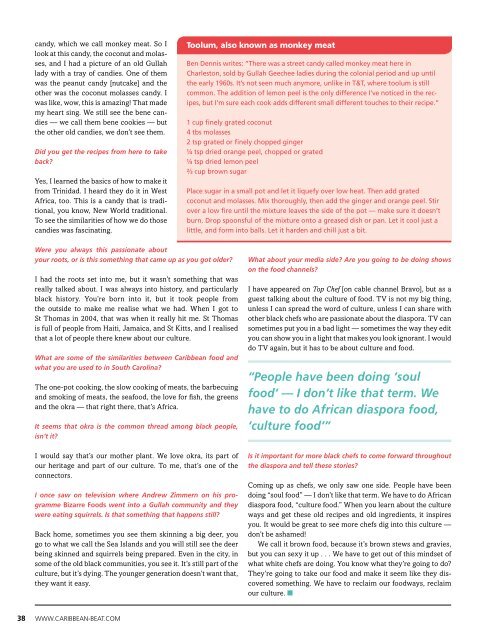You also want an ePaper? Increase the reach of your titles
YUMPU automatically turns print PDFs into web optimized ePapers that Google loves.
candy, which we call monkey meat. So I<br />
look at this candy, the coconut and molasses,<br />
and I had a picture of an old Gullah<br />
lady with a tray of candies. One of them<br />
was the peanut candy [nutcake] and the<br />
other was the coconut molasses candy. I<br />
was like, wow, this is amazing! That made<br />
my heart sing. We still see the bene candies<br />
<strong>—</strong> we call them bene cookies <strong>—</strong> but<br />
the other old candies, we don’t see them.<br />
Did you get the recipes from here to take<br />
back?<br />
Yes, I learned the basics of how to make it<br />
from Trinidad. I heard they do it in West<br />
Africa, too. This is a candy that is traditional,<br />
you know, New World traditional.<br />
To see the similarities of how we do those<br />
candies was fascinating.<br />
Toolum, also known as monkey meat<br />
Ben Dennis writes: “There was a street candy called monkey meat here in<br />
Charleston, sold by Gullah Geechee ladies during the colonial period and up until<br />
the early 1960s. It’s not seen much anymore, unlike in T&T, where toolum is still<br />
common. The addition of lemon peel is the only difference I’ve noticed in the recipes,<br />
but I’m sure each cook adds different small different touches to their recipe.”<br />
1 cup finely grated coconut<br />
4 tbs molasses<br />
2 tsp grated or finely chopped ginger<br />
¼ tsp dried orange peel, chopped or grated<br />
¼ tsp dried lemon peel<br />
²⁄ ³ cup brown sugar<br />
Place sugar in a small pot and let it liquefy over low heat. Then add grated<br />
coconut and molasses. Mix thoroughly, then add the ginger and orange peel. Stir<br />
over a low fire until the mixture leaves the side of the pot <strong>—</strong> make sure it doesn’t<br />
burn. Drop spoonsful of the mixture onto a greased dish or pan. Let it cool just a<br />
little, and form into balls. Let it harden and chill just a bit.<br />
Were you always this passionate about<br />
your roots, or is this something that came up as you got older?<br />
I had the roots set into me, but it wasn’t something that was<br />
really talked about. I was always into history, and particularly<br />
black history. You’re born into it, but it took people from<br />
the outside to make me realise what we had. When I got to<br />
St Thomas in 2004, that was when it really hit me. St Thomas<br />
is full of people from Haiti, Jamaica, and St Kitts, and I realised<br />
that a lot of people there knew about our culture.<br />
What are some of the similarities between <strong>Caribbean</strong> food and<br />
what you are used to in South Carolina?<br />
The one-pot cooking, the slow cooking of meats, the barbecuing<br />
and smoking of meats, the seafood, the love for fish, the greens<br />
and the okra <strong>—</strong> that right there, that’s Africa.<br />
It seems that okra is the common thread among black people,<br />
isn’t it?<br />
I would say that’s our mother plant. We love okra, its part of<br />
our heritage and part of our culture. To me, that’s one of the<br />
connectors.<br />
I once saw on television where Andrew Zimmern on his programme<br />
Bizarre Foods went into a Gullah community and they<br />
were eating squirrels. Is that something that happens still?<br />
Back home, sometimes you see them skinning a big deer, you<br />
go to what we call the Sea Islands and you will still see the deer<br />
being skinned and squirrels being prepared. Even in the city, in<br />
some of the old black communities, you see it. It’s still part of the<br />
culture, but it’s dying. The younger generation doesn’t want that,<br />
they want it easy.<br />
What about your media side? Are you going to be doing shows<br />
on the food channels?<br />
I have appeared on Top Chef [on cable channel Bravo], but as a<br />
guest talking about the culture of food. TV is not my big thing,<br />
unless I can spread the word of culture, unless I can share with<br />
other black chefs who are passionate about the diaspora. TV can<br />
sometimes put you in a bad light <strong>—</strong> sometimes the way they edit<br />
you can show you in a light that makes you look ignorant. I would<br />
do TV again, but it has to be about culture and food.<br />
“People have been doing ‘soul<br />
food’ <strong>—</strong> I don’t like that term. We<br />
have to do African diaspora food,<br />
‘culture food’”<br />
Is it important for more black chefs to come forward throughout<br />
the diaspora and tell these stories?<br />
Coming up as chefs, we only saw one side. People have been<br />
doing “soul food” <strong>—</strong> I don’t like that term. We have to do African<br />
diaspora food, “culture food.” When you learn about the culture<br />
ways and get these old recipes and old ingredients, it inspires<br />
you. It would be great to see more chefs dig into this culture <strong>—</strong><br />
don’t be ashamed!<br />
We call it brown food, because it’s brown stews and gravies,<br />
but you can sexy it up . . . We have to get out of this mindset of<br />
what white chefs are doing. You know what they’re going to do?<br />
They’re going to take our food and make it seem like they discovered<br />
something. We have to reclaim our foodways, reclaim<br />
our culture. n<br />
38 WWW.CARIBBEAN-BEAT.COM


















